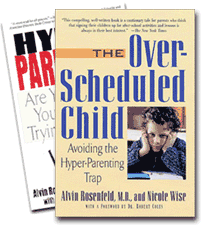
What Children Really Need

Many of the most loving parents we know today work hard to give their kids every advantage; if necessary, most of us would throw ourselves in front of a truck to save the children we love so deeply. But sadly, a lot of contemporary moms and dads don't see what it is their children need most. Hint: It's not Baby Mozart, Peewee soccer, or more afternoon enrichment activities!
We, ourselves, are what our kids need most. Children thrive when they have close, connected relationships with their parents, a happy, relaxed family life, and the deep inner conviction that they are loved for who they are, not for the things they do well. They need parents who can accept themselves and share what they love - be it the Beatles, Beethoven, or The Backstreet Boys -- and who appreciate what fascinates their kids. That kind of intimate connection provides the interpersonal foundation upon which children will be able to build happy, successful lives of their own.
"Hyper-parenting" and over-scheduling kids, the child-rearing styles now prevalent across America, distract us from what really matters. They've led parents to believe that if they are to do right by their children, they ought to start working early on, even before elementary school, to provide every advantage that might help assure admission to an elite college (often seen as the ultimate goal, and measure, of excellent child-rearing.) Furthermore, "good" parents should involve themselves in every detail of a child's academic, athletic, and social life.
Ironically, that approach is counter-productive. Children acquire self-reliance through trial and error. They can't learn resilience from a tutor. If we follow this hyper, micro-managing model to maximize our children's potential and to spare them any disappointment or failure, we make it harder for them to learn some of life's most important lessons -- at the very time when it is safest to do so, living in a loving home with supportive parents and no real responsibilities! Rather than becoming the authors of their lives, such kids end up feeling that they are following a script someone else is writing. Furthermore, enrolling children in numerous activities may actually damage their self-esteem. This busy schedule, the emphasis on performance and production, and the constant scrutiny that goes with it gives them the subliminal message that they are inadequate in their current, unpolished state: "If I am as good as my parents say I am, why do I need constant enrichment and improvement? Likely I am not very good at all." That is not the message we parents want to give.
What To Do?
Families need to regain moderation and balance. This week, as you review the myriad small tasks and favors you do for your children, ask yourself: Why am I doing this? Does he need me to do this for him? Can she do this for herself? Is there a lesson here I ought to let my child learn? Ask yourself these questions about the activities your child is participating in: Do they enrich his or her life? Are they important, for their own sake? Does getting them to every scheduled activity make me feel stressed and pressured, like I have no time for myself? Don't worry; you don't have to do anything yet. Change begins with awareness. Next week we will find out if your family is over-scheduled.
|
|
 |
|